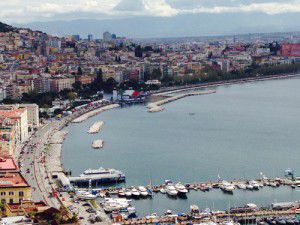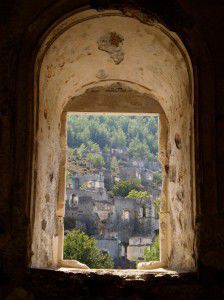A little language goes a long way
As marketing manager here at EuroTalk, it’s my job to tell everyone how great our products are. But from time to time, I need to use them for myself and I get reminded all over again just how useful they are.
 Last weekend I spent a few days in Naples, Italy. I was determined before I left to try and speak a little bit of Italian; after all I spend most of my time telling other people they have to speak the local language, not to mention it just seemed like the polite thing to do. As it turned out, it was also quite necessary because to our surprise, although it’s a pretty touristy area, not many people spoke English. Fortunately I’d come prepared with uTalk on my phone, and it turned out to be invaluable.
Last weekend I spent a few days in Naples, Italy. I was determined before I left to try and speak a little bit of Italian; after all I spend most of my time telling other people they have to speak the local language, not to mention it just seemed like the polite thing to do. As it turned out, it was also quite necessary because to our surprise, although it’s a pretty touristy area, not many people spoke English. Fortunately I’d come prepared with uTalk on my phone, and it turned out to be invaluable.
I left home with no Italian at all, apart from the basics – ‘ciao’, ‘grazie’ and ‘per favore’ were the first words I tried out (all included in the free version of the app). I’d also learnt the numbers up to three in advance, so I could ask for a table in restaurants. Pretty soon I realised I also needed to know ‘una bottiglia d’acqua’ because it was quite hot and sunny (when it wasn’t pouring with rain), and some higher numbers so I knew how much money I was being asked for. So out came uTalk for a quick revision session.
The first time we went to a restaurant, the waiter spoke some English and somehow identified us as Brits the moment we walked in, so my contribution was fairly limited, although I was insistent that I wanted to say what I could in Italian. The following night, I managed to ask for the bill, thanks to a quick check of my phone. And by the last night, I was able to order dessert by describing what I wanted (‘una torta de fragole’) and was astonished and delighted when the waiter brought me exactly what I wanted without any confusion. (We also got free limoncello at that restaurant – although I think they might have given that to everyone.)
Our main challenge in Naples was figuring out the ‘funicolare’ – which, by the way, is the weirdest way I’ve ever travelled. (For those who aren’t familiar, it’s basically a little train/car that carries people up and down the mountain – but on the inside and at a 45 degree angle. It’s quite surreal.) I’ll admit there was a bit of English used when I asked the man in the station how it all worked the first time, but then after another quick check of uTalk, I managed to buy us three tickets (‘bigliettos’) from the slightly intimidating lady in the little shop next door.
None of my conversations were particularly long or profound, but every time I said something in Italian and the person I was speaking to understood me, I gained a little bit of confidence. By the time I left, I was quite looking forward to these little exchanges, and was a bit disappointed if someone talked to me in English. There were a lot of Brits around, as we were all there for the Davis Cup tennis (the less said about that the better) and we witnessed a few fellow tourists adopting the ‘talk louder in English’ approach, not to mention quite a lot more standing around looking very confused in the funicolare station. So it was quite satisfying to know that we’d made the effort; the locals I spoke to certainly seemed to appreciate it. And yes, there were a couple of occasions when they thought I knew more than I did and started chatting away in rapid Italian, but somehow I managed to fumble my way through it (‘non capisco’ – I don’t understand – is another important phrase to learn).
It’s always useful to learn a few words before you leave for your holiday, but for me the most useful thing about uTalk was that I always had access to the vocabulary – written and spoken – whenever I needed it. I wouldn’t necessarily have thought to look up ‘strawberries’ and ‘cake’ before I left, for example, so without uTalk I might have missed out on this amazing dessert. And that would have been a tragedy.
15 cultural faux pas to avoid when travelling
Before you go on holiday, or on a business trip abroad, it’s a great idea to learn a little of the local language. But getting along with people is about much more than just the words you say. There are other rules too, so here are our top tips to avoid misunderstandings abroad.
1. Be very careful when exchanging business cards in Japan: they aren’t just cards, but representations of the giver and should be handled with some ceremony. NEVER write on a business card or put it in your back pocket, as this is considered disrespectful.
2. Don’t talk about work over dinner in New Zealand, even if you’re having a meal with your colleagues. It’s fine to talk business over lunch, though.
3. In Muslim countries it’s considered an insult if you show the soles of your feet, so watch how you sit.
4. If you’re in Hungary and you’ve been told your meeting is at ‘fél négy’ (‘half four’), don’t turn up at 4:30 – ‘fél négy’ actually means half an hour TO four, so you’ll need to be there at half past three.
5. On the other hand, if you’ve been invited to a gathering in France, always aim to arrive 15-30 minutes late, to allow the host time to get ready.
6. Making a circle with your forefinger and thumb as another way of saying ‘OK’ is seen as an extremely offensive gesture in Brazil. As is the ‘thumbs up’ gesture in Iran, and showing your palm in Greece. It might be better to just avoid hand gestures altogether…
7. In Germany, not making eye contact when you clink glasses is considered very rude. It also, apparently, means you’ll have seven years’ bad luck in the bedroom. So even if you’re not worried about being thought bad-mannered, it might be worth making the effort. Just in case.
8. In Bulgaria, nodding your head means no, and shaking your head means yes, which is the opposite of what most of us are used to. This is worth remembering or you could get yourself into all kinds of trouble.
9. It’s been illegal to bring chewing gum into Singapore since 2004, because of the damage being caused to public buildings and facilities by people leaving their gum behind. You can also be fined for not flushing a public toilet.
10. In Russia, if you’re giving someone flowers, make sure you give them an odd number. Even numbers are for funerals.
11. It’s important to show respect to your elders in Asia, so don’t call them by their name; instead use ‘Auntie’ or ‘Uncle’, even if you don’t know them.
12. When eating a meal in Spain, you’ll be expected to clear your plate, and leaving some food is seen as rude. In Russia, on the other hand, you’re expected to leave a little as a sign that your host has provided enough to fill you up. And in China, a polite belch when you finish eating is considered a compliment to the chef, although it’s frowned upon in many other countries.
13. Never say anything disrespectful about the king in Thailand, as this could land you in prison for several years.
14. Make sure you’re appropriately dressed before going to church in Italy. This means your shoulders, knees and midriff should all be covered, or you won’t be allowed in.
15. In Malawi, it’s common for people of the same sex to hold hands; this is a sign of close friendship, so don’t worry if someone tries to take your hand. It’s a compliment. Men and women holding hands is rare, though, and may be frowned upon.
As always, if anyone has any others, we’d love to hear from you!
10 of the world’s most amazing places
One of our top tips for learning a language is to take a holiday – it not only gives you a chance to practise your new language with the locals but you also get to visit somewhere nice. And why not take the opportunity to visit some of the world’s most amazing (if sometimes slightly bizarre) places while you’re at it?
1. San Alfonso del Mar
Like the world’s largest swimming pool, for instance, which is at San Alfonso del Mar in Chile. If you’re thinking of swimming lengths, you might want to stock up on energy drinks before diving in to this one. It’s more than 1,013 metres long, so paddlers should beware! It also has a 35-metre deep end – not for the unwary swimmer. The Guinness Book of Records named this pool as the biggest in the world, needing 66 million gallons of water to fill it up.
2. Mt HuaShan
Or maybe you’d like to visit a traditional Chinese tea house. What about this one, at the top of Mt. HuaShan? It’s 2,160 metres high and the path to get there is nothing short of terrifying. It’s thought that there may be as many as 100 fatal falls a year, and yet the trail is popular with tourists, keen to visit the teahouse, on the southern summit of the mountain, which used to be a Taoist temple, or the chess pavilion on the east peak.
3. Stewart Island
If bird-watching is your thing, you could visit Stewart Island in New Zealand. It’s one of the most remote destinations in the world, with only one town, Halfmoon Bay (also known as Oban) and an estimated population of just 450 people. The island is the only place to see the Kiwi bird in its natural habitat and is also home to five species of penguin.
4. Pink Lake
Next door in Australia, Pink Lake, just west of Esperance, is worth a visit. As its name would suggest, in certain weather conditions the water in the lake is pink, thanks to a particular kind of algae in the water. And this isn’t the only pink lake in the area. Lake Hillier, on Middle Island, is another example and an even brighter colour.
5. Joffre Lakes
However, if you prefer your lakes blue, the Canadian park of Joffre Lakes in British Columbia comes highly recommended. The lakes are a more traditional, but stunningly beautiful, turquoise blue and surrounded by peaks and glaciers. A trip to Joffre Lakes isn’t complete without an overnight stay, where you can camp under the stars and listen to the ice calving from the glacier.
6. Kizhi
The Russian island of Kizhi is found almost exactly at the centre of Lake Onega and boasts a spectacular wooden church, the Church of the Transfiguration, which was built in the 18th century without a single nail. Legend says that the lead builder used just one axe for the whole building, and then threw it in the lake when the church was completed, saying, ‘There was not and will not be another one to match it.’
7. Kayaköy
Just a few miles from the popular resort of Fethiye in southwestern Turkey, on the side of a mountain, is the village of Kayaköy. Greek-speaking Christians lived there until the 1920s but the village was abandoned follow a population exchange agreement between Turkey and Greece in 1923. Now a museum and historical monument, Kayaköy is a beautiful but rather eerie ghost town.
8. Capuchin monastery
Speaking of eerie, the Capuchin monastery in Sicily is home to 8,000 mummified corpses in the monastery catacombs. The bodies are all dressed in their best clothes and arranged in different rooms according to the type of person. The oldest in the collection dates from 1599, while the most recent addition is the body of Rosalia Lomabardo, who was embalmed in 1920 and is known as ‘Sleeping Beauty’.
9. ICEHOTEL
If you’re looking for somewhere a bit different to stay, you could try the ICEHOTEL in Jukkasjärvi, Sweden. Made with ice from the Torne River, the hotel offers ice and snow rooms, and runs a survival course every night for new guests on what to wear and how to cope when sleeping in temperatures below zero. But don’t worry – warm rooms are also available if you’re not a fan of the cold.
10. Malapascua
One extreme to the other – the island of Malapascua in the Phillippines boasts beautiful beaches and is most popular with divers, as it’s the only place in the world to see the pelagic thresher shark. There’s no transport on the island because it’s small enough to walk everywhere, and the only way to arrive on the island is by banca (a local boat ferry).
We hope that’s given you a few ideas for your next holiday. Don’t forget to learn a few words in the local language before you leave! And if we missed your favourite place, let us know in the comments…
The Trouble with the Title
Today’s post is by our Italian intern, Ambra Calvi, a film fan who’s noticed some interesting translations of movie titles…
One of the main pleasures of learning a new language is getting to that point when you are able to watch a film in that language, and you start to understand bits and pieces. Nowadays, it’s become fairly easy to get hold of foreign titles. In the UK in particular, the range of titles available is very diverse, sustained by a long standing interest in so-called “world cinema”. On top of the usual foreign Oscar contenders every year, you can also catch the latest works of an upcoming Turkish director, or challenge yourself with a Thai action film, or spend the afternoon with a gripping Argentine drama.
 However, when a film is made available to international audiences outside the nation where it was made, it has to go through an essential process: the translation of its title. This is just one part of the bigger process of localisation which involves translating and adapting all the dialogues for subtitling or dubbing, but it’s an essential part. The title is the film’s immediate presentation, its way of attracting viewers, giving them a hint of the story and instiling some expectations about the experience they are going to have. Together with the poster, those few words can be crucial for the success of the film.
However, when a film is made available to international audiences outside the nation where it was made, it has to go through an essential process: the translation of its title. This is just one part of the bigger process of localisation which involves translating and adapting all the dialogues for subtitling or dubbing, but it’s an essential part. The title is the film’s immediate presentation, its way of attracting viewers, giving them a hint of the story and instiling some expectations about the experience they are going to have. Together with the poster, those few words can be crucial for the success of the film.
Growing up in Italy and being a film buff from a very early age, this is an issue that I’ve had to deal with quite a few times. At weekends, when choosing which film to watch from the leaflet of my local multiplex, if I didn’t know some films I would naively rely on the way their titles sounded. Unfortunately, this wasn’t always a good idea. I soon realised that somewhere in the mysterious places where the films were prepared for the Italian market, some people were using their creative flair to catastrophic results.
I’ll give you some examples: have you ever seen Crystal Trap? Doesn’t ring a bell? That’s because it’s the title under which Die Hard was released in Italy in the Eighties (as “Trappola di cristallo”). What about The Fleeting Moment? No? Well, that was Dead Poets Society (“L’attimo fuggente”). More recently, you could have seen posters of Bitter Paradise (“Paradiso amaro”), and had it not been for George Clooney sitting on a Hawaiian beach you would have never recognised The Descendants.
After keeping an eye on this worrying trend in the past years, I can now group these frequent translation oddities in recurrent categories:
- Radical changes from the original title, often resulting in a more banal – or just silly – new one: see for example How to Lose Friends and Alienate People, translated as Star System: If You’re Not There You Don’t Exist (“Se non ci sei non esisti”). Even worse, The Back-up Plan, which became Nice to Meet You, I’m a Bit Pregnant (“Piacere, sono un po’ incinta”). Similarly, The Break Up was translated as I Hate You, I Dump You, I… (“Ti odio, ti lascio, ti…”). Sometimes the changes of meaning in the title are completely unnecessary: can anyone explain to me why Beasts of the Southern Wild had to become King of the Wild Land (“Re della terra selvaggia”)?
- An unexplainable tendency to romanticize: the popular The Shawshank Redemption became The Wings of Freedom (“Le ali della libertà”), and The Place Beyond the Pines, the new Ryan Gosling film, will be released as Like a Thunder (“Come un tuono”). More specifically, there seems to be a belief that inserting the word “love” in a title will magically attract millions of people craving for super sentimental stories: following this theory, The Time Traveler’s Wife was translated as A Sudden Love (“Un amore all’improvviso”), and the Johnny Cash biopic Walk the Line became When Love Burns the Soul (“Quando l’amore brucia l’anima”).
- The real horror happens when translators come up with one bad title, and in the years to come they use a series of variations for other non-related films. This happened with Runaway Bride, with Julia Roberts and Richard Gere, which was translated as If You Run Away I’ll Marry You (“Se scappi ti sposo”), and was then followed by Intolerable Cruelty becoming First I’ll Marry You Then I’ll Ruin You (“Prima ti sposo poi ti rovino). Then the lowest point in this disaster: the dreamy, wonderful Eternal Sunshine of the Spotless Mind was smuggled as If You Leave Me I’ll Erase You (“Se mi lasci ti cancello”), alienating the sympathies of most sensible viewers. A similar fashion started with The Texas Chainsaw Massacre becoming Don’t Open That Door (“Non aprite quella porta”), which generated Don’t Enter that School (“Non entrate in quella scuola”, originally Prom Night) and Don’t Open That Closet (“Non aprite quell’armadio”, which was Monster in the Closet).
 There are – unfortunately – hundreds of other examples, but this is enough to show how a bad title translation can completely alter the destiny of a film, consigning some masterpieces to oblivion only because they are mistaken for something completely different, or because they sound like cheap b-movies. While in some cases of films with short, simple titles, keeping the original version can be the best solution, generally speaking Italian distributors should really make an effort and try to come up with creative, honest ideas to maintain the intention of the director. After all, Italy has a great tradition in literary translation, so I don’t see why we shouldn’t do our best when it comes to films as well.
There are – unfortunately – hundreds of other examples, but this is enough to show how a bad title translation can completely alter the destiny of a film, consigning some masterpieces to oblivion only because they are mistaken for something completely different, or because they sound like cheap b-movies. While in some cases of films with short, simple titles, keeping the original version can be the best solution, generally speaking Italian distributors should really make an effort and try to come up with creative, honest ideas to maintain the intention of the director. After all, Italy has a great tradition in literary translation, so I don’t see why we shouldn’t do our best when it comes to films as well.
If anyone has any other examples of strange film title translations, we’d love to hear them!
Ambra








